- Home
- Tad Williams
The Dragonbone Chair Page 2
The Dragonbone Chair Read online
Page 2
Rachel had not missed the exchange of looks.
“Lord whip you for a donkey, boy, didn’t I tell you to get to work? Have at it, then!”
“At what? Do what?” Simon shouted, and was mortified to hear Hepzibah’s silvery giggle float out from the hallway. He pinched his own arm in frustration. It hurt.
“Take this broom, and go and sweep out the Doctor’s chambers. That man lives like a pack rat, and who knows where the king will want to go now that he’s up?” It was clear from her tone that Rachel found the general contrariness of men to be undiminished by kingship.
“Doctor Morgenes’ chambers?” Simon asked; for the first time since he had been discovered in the garden his spirits rose. “I’ll do it straight away!” He snatched the broom at a dead run and was gone.
Rachel snorted and turned back to examine the spotless perfection of the antechamber. She briefly wondered what could possibly be going on behind the great throne-room door, then dismissed the errant thought as mercilessly as she might swat a hovering gnat. Herding her legions with clapping hands and steely eye, she led them out of the antechamber and off to another pitched battle against her archenemy, disorder.
In that hall beyond the door dusty banners hung, row upon row along the walls, a faded bestiary of fantastic animals: the sun-golden stallion of Clan Mehrdon, Nabban’s gleaming kingfisher crest, owl and ox, otter, unicorn, and cockatrice—rank after rank of silent, sleeping creatures. No draft stirred these threadbare hangings; even the spiderwebs sagged empty and unstitched.
Some small change had come to the throne room, though—something lived once more in the shadowed chamber. Someone was singing a quiet tune in the thin voice of a very young boy or a very old man.
At the farthest end of the hall a massive tapestry hung on the stone wall between the statues of the High Kings of the Hayholt, a tapestry bearing the royal coat of arms, the Firedrake and the Tree. The grim malachite statues, an honor guard of six, flanked a huge, heavy chair that seemed entirely carved from yellowing ivory, the chair arms knobbed and knuckled, the back capped with a huge, many-toothed, serpentine skull whose eyes were pools of shadow.
It was on and before this chair that two figures sat. The small one clothed in worn motley was singing; it was his voice that floated up from the foot of the throne, too weak to chip loose even a slight echo. Over him bent a gaunt shape, perched at the edge of the chair like an aged raptor—a tired, hobbled bird of prey shackled to the dull bone.
The king, three years sick and enfeebled, had returned to his dusty hall. He listened as the small man at his feet sang; the king’s long, mottled hands grasped the arms of his great, yellowing throne.
He was a tall man—once very tall, but now hunched like a monk at prayer. He wore a sagging robe of sky blue, and was bearded like a Usirean prophet. A sword lay athwart his lap, shining as though new-polished; on his brow sat an iron crown, studded all about with sea-green emeralds and secretive opals.
The mannekin at the king’s feet paused for a long, silent moment, then began another song:
“Can tha count th’ rain-drops
When th’ sun is high?
Can tha swim th’ river
When th’ bed gang dry?
Can tha catch a cloud?
Nay, canst not, nor I…
An’ th’ wind a cry ‘Wait.’
As a passeth by.
Th’wind a cry ‘Wait.’
As a passeth by…”
When the tune was finished, the tall old man in the blue robe reached down his hand and the jester took it. Neither said a word.
John the Presbyter, Lord of Erkynland and High King of all Osten Ard; scourge of the Sithi and defender of the true faith, wielder of the sword Bright-Nail, bane of the dragon Shurakai…Prester John was sitting once more upon his chair made of dragon’s bones. He was very, very old, and had been crying.
“Ah, Towser,” he breathed at last, his voice deep but flawed with age, “it is surely an unmerciful God who could bring me to this sorry pass.”
“Perhaps, my lord.” The little old man in the checkered jerkin smiled a wrinkled smile. “Perhaps…but doubtless many others would not complain of cruelty if brought to your station in life.”
“But that is just what I mean, old friend!” The king shook his head angrily. “In this shadow-age of infirmity, all men are leveled. Any thick-witted tailor’s apprentice sups more of life that I!”
“Ah, la now my lord, my lord…” Towser’s grizzled head wagged from side to side, but the bells of his cap—long since clapperless—did not jingle. “My lord, you complain seasonably, but unreasonably. All men come to this pass, great or small. You have had a fine life.”
Prester John lifted the hilt of Bright-Nail before him, holding it as though it were a Holy Tree. He pulled the back of a long thin hand across his eyes.
“Do you know the story of this blade?” he asked.
Towser looked up sharply: he had heard the story many times.
“Tell me, O King,” he said quietly.
Prester John smiled, but his eyes never left the leather-bound hilt before him. “A sword, small friend, is the extension of a man’s right hand…and the end point of his heart.” He lifted the blade up higher, so that it caught a glimmer of light from one of the tiny, high windows. “Just the same is Man the good right hand of God—Man is the sharp executor of the Heart of God. Do you see?”
Suddenly he was leaning down, eyes bird-bright beneath shaggy brows. “Do you know what this is?” His shaking finger indicated a bit of crimped, rusty metal bound into the sword haft with golden wire.
“Tell me, Lord.” Towser knew perfectly well.
“This is the only nail of the true Execution Tree still remaining in Osten Ard.” Prester John brought the hilt forward to his lips and kissed it, then held the cool metal against his cheek. “This nail came from the palm of Usires Aedon, our Savior…from His hand…” The king’s eyes, catching for a moment a strange halflight from above, were fiery mirrors.
“And there is also the relic, of course,” he said after a quiet moment, “the finger-bone of martyred Saint Eahlstan, the dragonslain, right here in the hilt…”
There was another interval of silence, and when Towser looked up his master was weeping again.
“Fie, fie on it!” John moaned. “How can I live up to the honor of God’s Sword? With so much sin, such a weight of it, still staining my soul—the arm that once smote the red dragon can now scarce lift a milk-cup. Oh, I am dying, my dear Towser, dying!”
Towser leaned forward, pulling one of the king’s bony hands free from the sword-grip and kissing it as the old man sobbed.
“Oh, please, master,” the jester beseeched. “Weep no more! All men must die—you, I, everyone. If we are not killed by youthful stupidity or ill-luck, then it is our fate to live on like the trees; older and older until at last we totter and fall. It is the way of all things. How can you fight the Lord’s will?”
“But I built this kingdom!” A quivering rage was on John the Presbyter as he pulled his hand free from the jester’s grasp and brought it sharply down on the arm of his throne. “That must weigh against any blot of sin on my soul, however dark! Surely the Good Lord will have that in his Book of Accounts! I dragged these people up from the mud, scourged the cursed, sneaking Sithi out of the countryside, gave the peasantry law and justice…the good I have done must weigh strongly.” For a moment John’s voice became fainter, as though his thoughts wandered elsewhere.
“Ah, my old friend,” he said at last in a bitter voice, “and now I cannot even walk down to the marketplace on Main Row! I must lie in bed, or shuffle about his cold castle on the arms of younger men. My…my kingdom lies corrupting on the vine, while servants whisper and tiptoe outside my bedchamber door! All in sin!”
The king’s words echoed back from the chamber’s stone walls and slowly dissipated up among the swirling dust motes. Towser regained John’s hand and squeezed it until the king was compo
sed once more.
“Well,” said Prester John after some time had passed, “my Elias will rule more firmly than I now can, at least. Seeing the decay of all this,” he swept his hand around the throne room, “today I have decided to call him back from Meremund. He must prepare to take the crown.” The king sighed. “I suppose I should leave off my womanish weeping, and be grateful I have what many kings have not: a strong son to hold my kingdom together after I am gone.”
“Two strong sons. Lord.”
“Fah.” The king grimaced. “I should call Josua many things, but I do not believe ‘strong’ is one of them.”
“You are too hard on him. Master.”
“Nonsense. Do you think to instruct me, jester? Do you know the son better than the father does?” John’s hand trembled, and for a moment it seemed he would struggle to his feet. Finally, the tension slackened.
“Josua is a cynic,” the king began again in a quieter voice. “A cynic, a melancholic, cold to his inferiors—and a king’s son has nothing but inferiors, each one a potential assassin. No, Towse, he is a queer one, my younger—most especially since…since he lost his hand. Ah, merciful Aedon, perhaps the fault is mine.”
“What do you mean. Lord?”
“I should have taken another wife after Ebekah died. It has been a cold house without a queen…perhaps that caused the boy’s odd humors. Elias is not that way, though.”
“There is a certain crude directness to Prince Elias’ nature,” Towser muttered, but if the king heard he gave no sign.
“I thank beneficent God that Elias was first-born. He has a brave, martial character, that one—I think that if he were the younger, Josua would not be secure upon the throne.” King John shook his head with cold fondness at the thought, then groped down and grasped his jester’s ear, tweaking it as if that old worthy were a child of five or six years.
“Promise me one thing, Towse…?”
“What, Lord?”
“When I die—doubtless soon, I do not think I shall last the winter—you must bring Elias to this room…do you suppose they will hold the crowning here? Never mind you, if they do then must wait until it has ended. Bring him here and give him Bright-Nail. Yes, take it now and hold it. I fear that I may die while he is away at Meremund or some other place, and I want it to come straight to his hand with my blessing. Do you understand, Towse?”
With shaking hands Prester John pushed the sword back into its tooled scabbard, and struggled for a moment to unbuckle the baldric on which it hung. The twining was caught, and Towser got up on his knees to work on the knot with his strong old fingers.
“What is the blessing, my Lord?” he asked, tongue between teeth as he picked at the tangle.
“Tell him what I have told you. Tell him that the sword is the point of his heart and hand, just as we are the instruments of the Heart and Hand of God the Father…and tell him that no prize, however noble, is worth…is worth…” John hesitated, and drew his trembling fingers to his eyes. “No, pay that no mind. Speak only what I told you about the sword. Tell him that.”
“I shall, my King,” said Towser. He frowned, although he had solved the knot. “I will gladly do your wish.”
“Good.” Prester John leaned back once more in his dragonbone chair and closed his gray eyes. “Sing for me again, Towse.”
Towser did. Above, the dusty banners seemed to sway slightly, as if a whisper passed among the crowd of watchers, among the ancient herons and dull-eyed bears, and others stranger still.
2
A Two-Frog Story
An idle mind is the Devil’s seedbed.
Simon reflected ruefully on this, one of Rachel’s favorite expressions, as he stared down at the display of horse-armor which now lay scattered the length of the chaplain’s walking-hall. A moment before he had been leaping happily down the long, tiled hallway which ran along the outer length of the chapel, on his way to sweep Doctor Morgenes’ chambers. He had been waving the broom about a little, of course, pretending it was the Tree and Drake flag of Prester John’s Erkynguard, and that he was leading them into battle. Perhaps he should have been paying better heed to where he was waggling it—but what sort of idiot would hang a suit of horse-armor in the chaplain’s hallway, anyway? Needless to say, the clatter had been ferocious, and Simon expected skinny, vengeful Father Dreosan to descend at any minute.
Hurrying to gather up the dingy armor plates, some of which had torn loose from the leather straps that bound the suit together, Simon considered another of Rachel’s maxims—“the Devil finds chores for empty hands.” That was silly, of course, and made him angry. It was not the emptiness of his hands, or the idleness of his thoughts that got him into trouble. No, it was the doing and the thinking that tripped him up time and time again. If only they would leave him alone!
Father Dreosan had still not made an entrance by the time he at last worried the armor into a precarious stack, then hastily pushed it beneath the skin of a table rug. In doing so he nearly upset the golden reliquary seated on the table top, but at last—and with no further mishaps—the sundered armor was gone from view, with nothing but a slightly cleaner-looking patch on the wall to proclaim that the suit had ever existed at all. Simon picked up his broom and scuffed away at the sooty stone, trying to even up the edges so that the bright spot was not so noticeable, then hurried on down the hall and out past the winding choir-loft stairs.
Emerging once more into the Hedge Garden from which he had been so brutally abducted by the Dragon, Simon halted for a moment to inhale the pungent smell of greenery, to drive the last of the tallow-soap stench from his nostrils. His eye was caught by an unusual shape in the upper branches of the Festival Oak, an ancient tree at the far end of the garden, so gnarled and convoluted of branch that it looked as though it had grown for centuries beneath a giant bushel basket. He squinted, hand raised to block the slanting sunlight. A bird’s nest! And so late in the year!
It was a very near thing. He had dropped the broom and taken several steps into the garden before he remembered his mission to Morgenes. If it had been any other errand he would have been up the tree in an instant, but getting to see the doctor was a treat, even when it entailed work. He promised himself that the nest would not remain long unexamined, and passed on through the hedges and into the courtyard before the Inner Bailey Gate.
Two figures had just entered the gate and were coming toward him; one slow and stumpy, the other stumpier and slower still. It was Jakob the chandler and his assistant Jeremias. The latter was carrying a large, heavy-looking bag over his shoulder, and walking—if such was possible—more sluggishly than usual. Simon called a greeting as they passed. Jakob smiled and waved.
“Rachel wants new candles for the dining room,” the chandler shouted, “so candles she gets!” Jeremias made a sour face.
A short trot down the sloping greensward brought Simon to the massive gatehouse. A sliver of afternoon sun still smoldered above the battlements behind him, and the shadows of the pennants of the Western Wall flopped like dark fish on the grass. The red-and-white liveried guard—scarcely older than Simon—smiled and nodded as the master spy pounded past, deadly broom in hand, head held low in case the tyrant Rachel should happen to peep from one of the keep’s high windows. Once through the barbican and hidden in the lee of the high gatewall he slowed to a walk. Green Angel Tower’s attenuated shadow bridged the moat; the distorted silhouette of the Angel, triumphant on her spire, lay in a pool of fire at the water’s farthest edge.
As long as he was here, Simon decided, he might as well catch some frogs. It shouldn’t take too long, and the doctor frequently had use for such things. It wouldn’t really be putting off the errand so much as expanding the nature of the service. He would have to hurry, though—evening was coming on swiftly. Already he could hear the crickets laboriously tuning up for what would be one of the waning year’s last performances and the bullfrogs beginning their muffled, clunking counterpoint.
Wading out into the
lily-crusted water, Simon paused for a moment to listen, and to watch the eastern sky darkening to a dull violet. Next to Doctor Morgenes’ chambers, the moat was his favorite spot in all Creation…all of it that he had seen so far, anyway.
With an unconscious sigh he pulled off his shapeless cloth hat and sloshed along toward where the pond grass and hyacinths were thickest.
The sun had completely vanished and the wind was hissing through the cattails ringing the moat by the time Simon had reached the Middle Bailey to stand, clothes a-drip and a frog in each pocket, before the door of Morgenes’ chambers. He knocked on the stout paneling, careful not to touch the unfamiliar symbol chalked on the wood. He had learned by hard experience not to carelessly lay hands on something of the doctor’s without asking. Several moments passed before Morgenes’ voice was heard.
“Go away,” it said, in a tone of annoyance.
“It’s me…Simon!” called Simon, and knocked again. There was a longer pause this time, then the sound of rapid footfalls. The door swung open. Morgenes, whose head barely reached Simon’s chin, stood framed in bright blue light, the expression on his face obscured. For a moment he seemed to stare.
“What?” he said finally. “Who?”
Simon laughed. “Me, of course. Do you want some frogs?” He pulled one of the captives from its prison and held it up by a slippery leg.
“Oh. Oh!” The doctor seemed to be coming awake as from a deep sleep. He shook his head. “Simon…but naturally! Come in, boy! My apologies…I am a little distracted.” He opened the door wide enough for Simon to slip past him into the narrow inner hallway, then pulled it closed again.
“Frogs, is it? Hmmmm, frogs…” The doctor angled past and led him along the corridor. In the glow of the blue lamps that lined the hall the doctor’s spindly form, monkeylike, seemed to bound instead of walk. Simon followed, his shoulders nearly touching the cold stone walls on either side. He could never understand how rooms that seemed as small as the doctor’s did from outside—he had looked down on them from the bailey walls, and paced the distance in the courtyard—how they could have such long corridors.

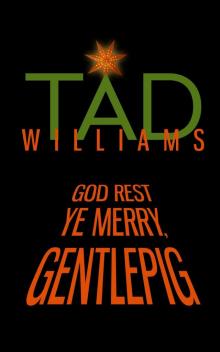 God Rest Ye Merry, Gentlepig
God Rest Ye Merry, Gentlepig Tailchaser's Song
Tailchaser's Song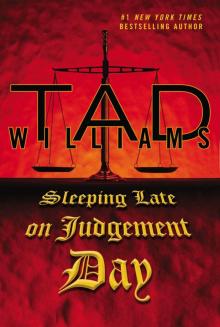 Sleeping Late on Judgement Day
Sleeping Late on Judgement Day Stone of Farewell
Stone of Farewell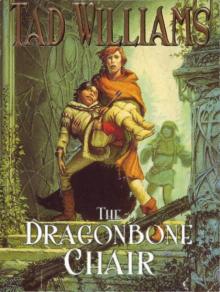 The Dragonbone Chair
The Dragonbone Chair Sea of Silver Light
Sea of Silver Light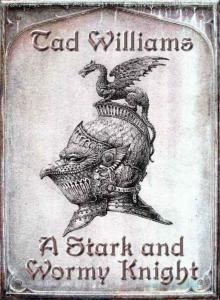 A Stark and Wormy Knight
A Stark and Wormy Knight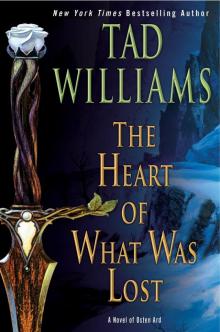 The Heart of What Was Lost
The Heart of What Was Lost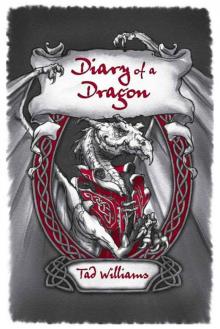 Diary of a Dragon
Diary of a Dragon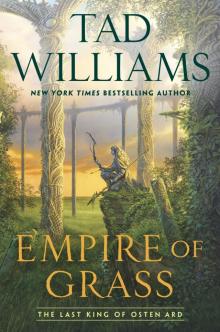 Last King of Osten Ard 02 - Empire of Grass
Last King of Osten Ard 02 - Empire of Grass To Green Angel Tower, Volume 1
To Green Angel Tower, Volume 1 The Dirty Streets of Heaven
The Dirty Streets of Heaven River of Blue Fire
River of Blue Fire The Very Best of Tad Williams
The Very Best of Tad Williams Mountain of Black Glass
Mountain of Black Glass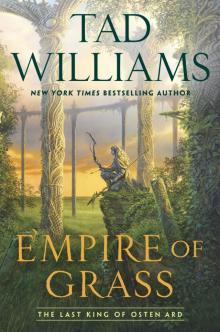 Empire of Grass
Empire of Grass City of Golden Shadow
City of Golden Shadow Happy Hour in Hell
Happy Hour in Hell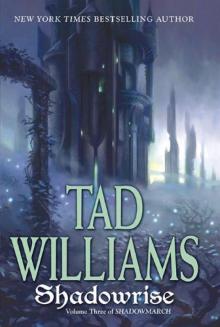 Shadowrise
Shadowrise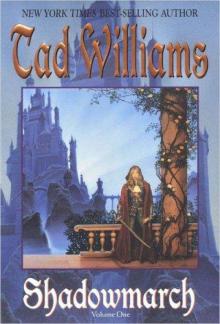 Shadowmarch
Shadowmarch Brothers of the Wind
Brothers of the Wind Shadowheart
Shadowheart Bobby Dollar 02 - Happy Hour In Hell
Bobby Dollar 02 - Happy Hour In Hell The War of the Flowers
The War of the Flowers The Dirty Streets of Heaven bd-1
The Dirty Streets of Heaven bd-1 Tad Williams - The War of the Flowers (retail) (pdf)
Tad Williams - The War of the Flowers (retail) (pdf) Shadowheart s-4
Shadowheart s-4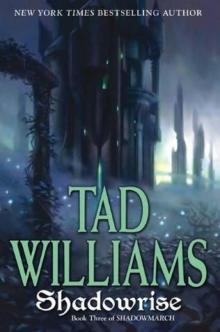 Shadowrise s-3
Shadowrise s-3 The Dirty Streets of Heaven: Volume One of Bobby Dollar
The Dirty Streets of Heaven: Volume One of Bobby Dollar The Stone of Farewell
The Stone of Farewell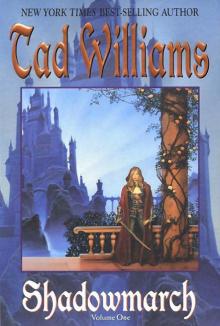 (Shadowmarch #1) Shadowmarch
(Shadowmarch #1) Shadowmarch The Secrets of Ordinary Farm of-2
The Secrets of Ordinary Farm of-2 Shadowmarch s-1
Shadowmarch s-1![Bobby Dollar [04] God Rest Ye Merry, Gentlepig Read online](http://i1.bookreadfree.com/i1/04/06/bobby_dollar_04_god_rest_ye_merry_gentlepig_preview.jpg) Bobby Dollar [04] God Rest Ye Merry, Gentlepig
Bobby Dollar [04] God Rest Ye Merry, Gentlepig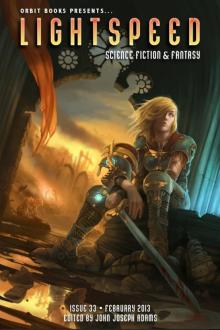 Lightspeed Issue 33
Lightspeed Issue 33 Sea of Silver Light o-4
Sea of Silver Light o-4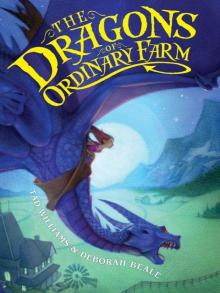 The Dragons of Ordinary Farm of-1
The Dragons of Ordinary Farm of-1 Shadowplay s-2
Shadowplay s-2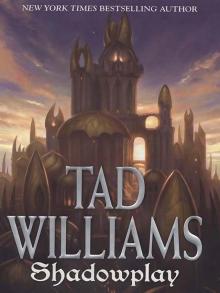 (Shadowmarch #2) Shadowplay
(Shadowmarch #2) Shadowplay